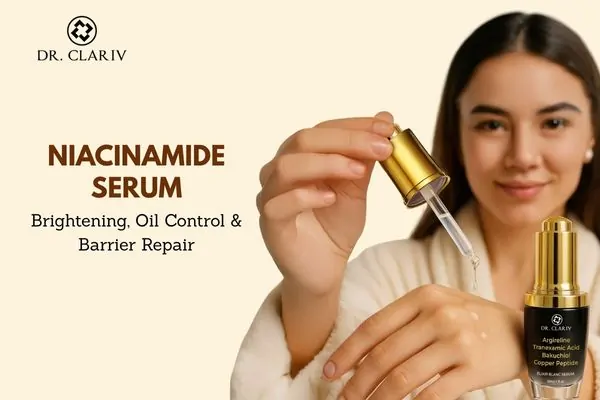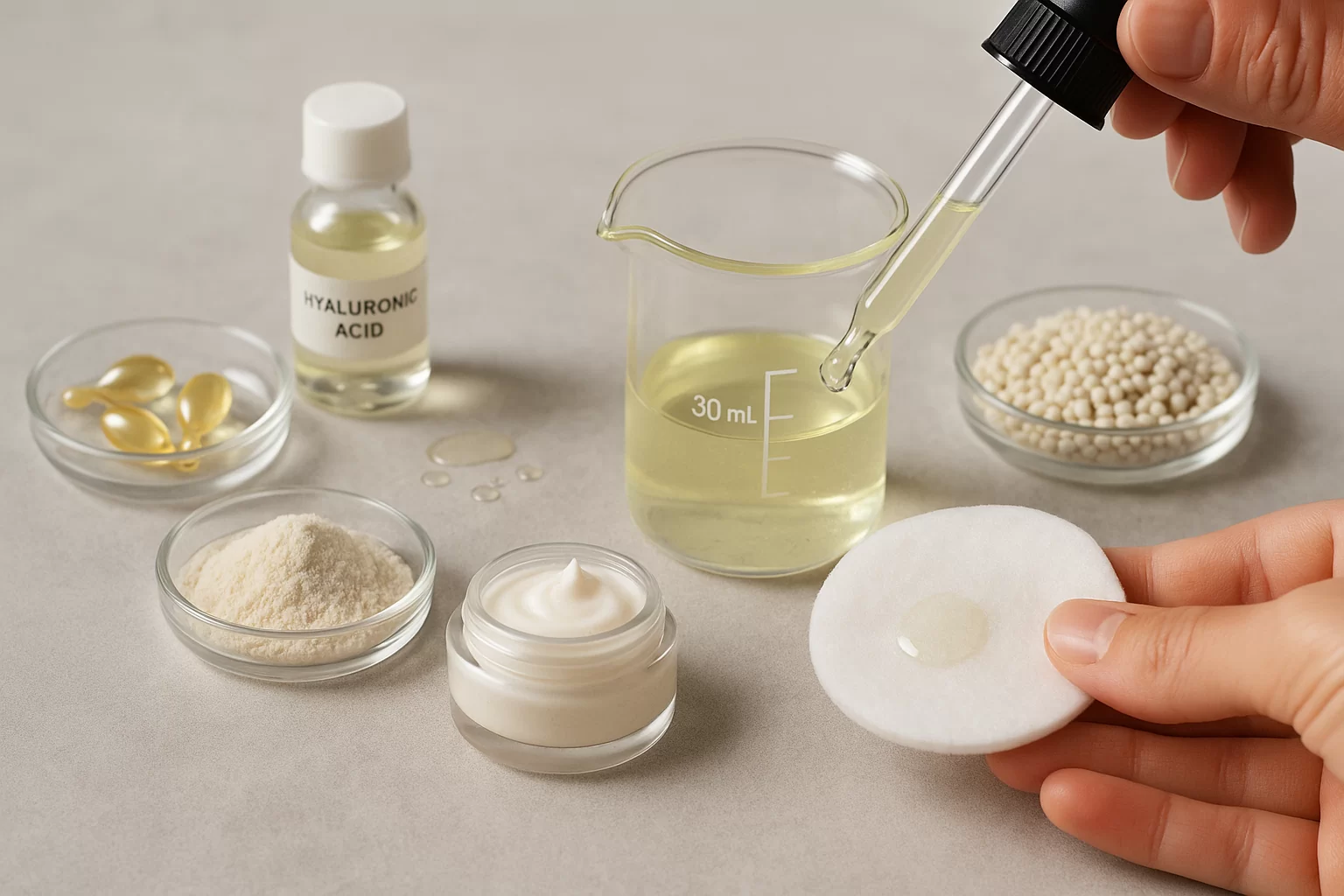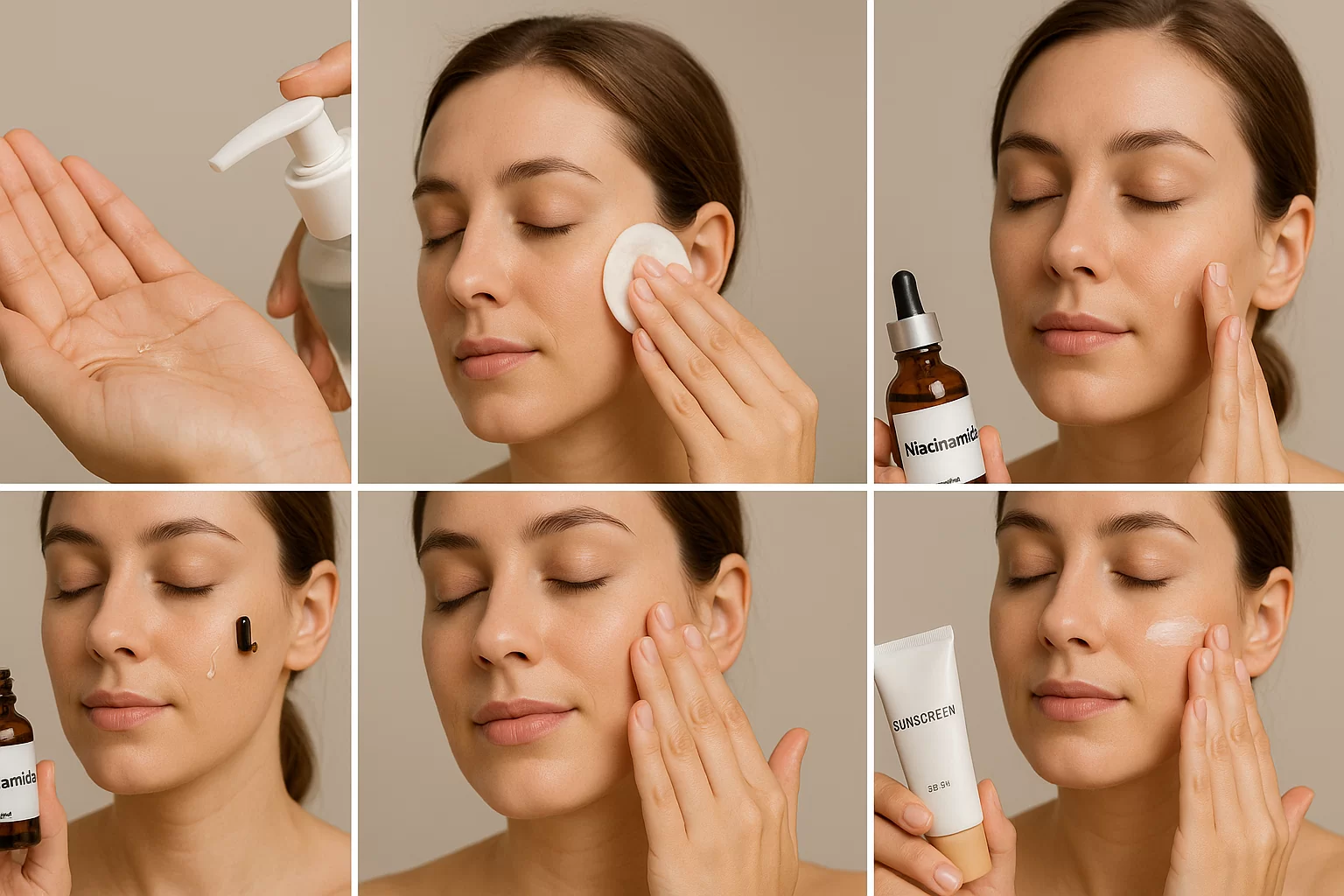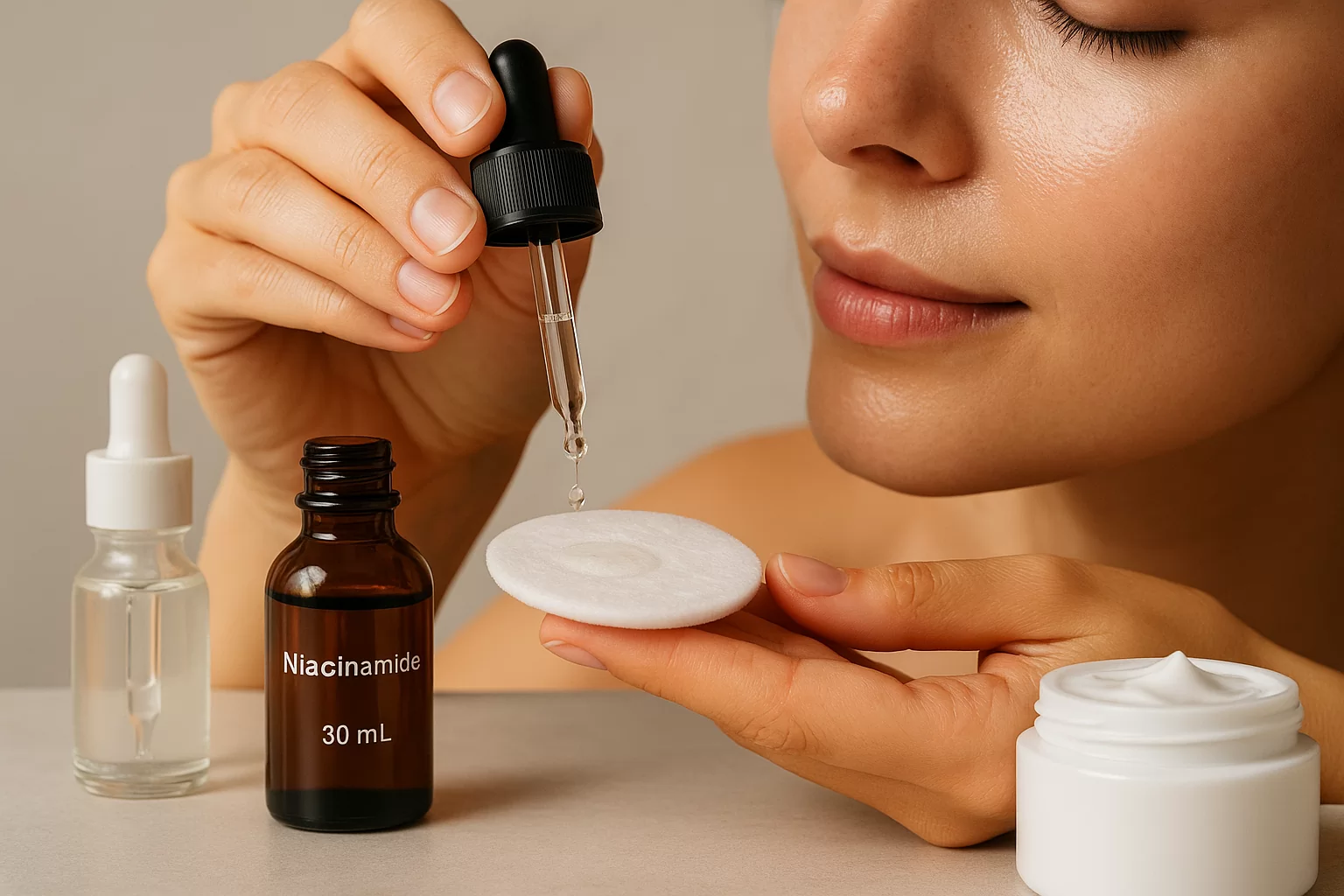BLOG, ELIXIR BLANC SERUM
Niacinamide Serum: Brightening, Oil Control & Barrier Repair
Niacinamide, also known as Vitamin B3, has become a beloved ingredient in skincare products due to its wide-ranging benefits and gentle action on the skin. It is known to be effective in addressing common skin concerns like hyperpigmentation, acne, and dry skin. Whether you’re aiming for a glowing complexion, minimizing blemishes, or improving overall skin health, niacinamide is a powerhouse ingredient worth considering. In this article, we will dive deeper into the benefits of niacinamide for skin brightening, spot reduction, oil control, and skin barrier repair, and how it works best when paired with hyaluronic acid. We will also provide guidance on how to choose the right niacinamide serum for your specific skin type.
What is Niacinamide and Why Should You Use It?
Understanding the Importance of Niacinamide in Skincare
Niacinamide, also known as Vitamin B3, is a water-soluble vitamin that is vital for maintaining the skin’s natural protective barrier. It plays a critical role in many biochemical processes in the skin, including the formation of ceramides (lipids that lock moisture into the skin), DNA repair, and fighting oxidative stress caused by environmental factors such as pollution and UV rays.
What makes niacinamide so appealing is its ability to target multiple skin issues simultaneously. It is well-tolerated by most skin types, including oily, acne-prone, and sensitive skin. Additionally, niacinamide is non-irritating and can be used daily without the risk of sensitization or peeling, making it an ideal ingredient for people looking for a gentle yet effective solution to common skincare concerns.
Niacinamide Pots Removal Serum
Brightens Skin Tone and Reduces Hyperpigmentation
Niacinamide is widely recognized for its ability to lighten dark spots, acne scars, and uneven skin tone. It works by inhibiting the transfer of melanin to the skin’s surface, which helps in fading hyperpigmentation and age spots. Regular use of niacinamide can lead to a more even skin tone and a brighter complexion over time.
Several studies have shown that niacinamide can reduce the appearance of dark spots and other pigmentation issues. It has been found to be effective in both superficial and deep pigmentation, making it a go-to ingredient for people dealing with post-inflammatory hyperpigmentation (PIH) from acne or sun damage.
Controls Excess Oil Production
One of the main causes of acne and clogged pores is an overproduction of sebum (oil) in the skin. Niacinamide is known for its ability to regulate sebum production, making it particularly beneficial for individuals with oily skin. By balancing the skin’s oil production, niacinamide helps prevent the clogging of pores that can lead to acne breakouts. This makes it an ideal ingredient for people with oily, combination, and acne-prone skin types.
Not only does niacinamide help balance oil production, but it also helps reduce inflammation and redness often associated with acne. This makes it a versatile and effective solution for both prevention and treatment of acne.
Strengthens the Skin Barrier
The skin barrier is your body’s first line of defense against external aggressors, such as pollutants, bacteria, and harmful UV rays. A compromised skin barrier can lead to dryness, irritation, and increased sensitivity. Niacinamide helps in the synthesis of ceramides, which are essential for maintaining a strong skin barrier. It also helps to retain moisture in the skin, preventing dehydration and keeping the skin hydrated for longer periods.
When the skin barrier is strong, it is better equipped to defend against harmful environmental factors, which in turn helps prevent premature aging and inflammation.
Reduces Acne and Prevents Breakouts
Niacinamide has anti-inflammatory properties that help soothe irritated skin and reduce the severity of acne. By regulating sebum production and calming inflammation, niacinamide can help both reduce existing acne lesions and prevent new breakouts from forming. Niacinamide’s ability to tackle the root causes of acne makes it a powerful treatment in your skincare regimen.
Studies have shown that niacinamide can reduce the size and redness of acne lesions, making it particularly effective in reducing the visible signs of acne inflammation.
Improves Skin Elasticity and Reduces Fine Lines
Niacinamide not only brightens the skin but also has anti-aging benefits. It helps to boost collagen production, which can improve the skin’s elasticity and reduce the appearance of fine lines and wrinkles. Regular use of niacinamide can result in firmer, smoother skin that looks and feels more youthful.
Research indicates that niacinamide’s ability to stimulate collagen production may help reduce the depth of wrinkles, leading to a visibly smoother complexion over time. For individuals looking to combat early signs of aging, niacinamide is an excellent addition to your skincare routine.
How Niacinamide Works with Hyaluronic Acid
Enhanced Hydration and Skin Barrier Protection
While niacinamide is effective on its own, it works even better when paired with other powerful skincare ingredients, such as hyaluronic acid. Hyaluronic acid is a naturally occurring substance in the skin that helps attract and retain moisture. It acts as a humectant, drawing water into the skin and ensuring that it stays hydrated and plump.
When combined with niacinamide, hyaluronic acid helps address multiple skin concerns at once:
-
Hydration: While niacinamide strengthens the skin barrier, hyaluronic acid ensures the skin stays deeply hydrated.
-
Brightening and Healing: Niacinamide works on pigmentation and skin tone, while hyaluronic acid supports the skin’s healing process by providing the necessary hydration for cell turnover.
-
Balanced Oil Production and Moisture Retention: Niacinamide helps reduce oil production, while hyaluronic acid ensures that the skin is not stripped of moisture, helping to balance hydration levels and keep the skin feeling fresh.
This combination of niacinamide and hyaluronic acid is ideal for oily, acne-prone, or sensitive skin, as it provides moisture without causing breakouts or irritation.
Choosing the Right Niacinamide Serum for Your Skin Type
Niacinamide Serum for Oily and Acne-Prone Skin
For oily and acne-prone skin, look for a niacinamide serum that includes additional ingredients like salicylic acid or tea tree oil. These ingredients help unclog pores and fight acne while niacinamide reduces inflammation and controls sebum production. The combination of these ingredients with hyaluronic acid ensures the skin stays hydrated without becoming greasy.
Niacinamide Serum for Sensitive Skin
Sensitive skin requires a gentle approach, so look for a niacinamide serum that is free from fragrances and harsh additives. A minimalist formulation containing niacinamide and hyaluronic acid is ideal for sensitive skin, as it hydrates and calms irritation without causing redness or stinging.
Niacinamide Serum for Hyperpigmentation
If you are targeting dark spots, melasma, or acne scars, choose a niacinamide serum that specifically mentions brightening and spot reduction. Niacinamide is particularly effective in addressing stubborn pigmentation, and its combination with hyaluronic acid accelerates the healing of the skin, helping to fade dark marks more quickly.
Minimalist Niacinamide Serums
Minimalist formulations are becoming increasingly popular for people who want a straightforward yet effective product. These serums typically contain just niacinamide and hyaluronic acid as their main ingredients, offering a simple, non-comedogenic option that suits a variety of skin types.
How to Use Niacinamide Serum for Best Results
Step-by-Step Guide to Applying Niacinamide Serum
To maximize the benefits of niacinamide serum, follow these simple steps:
-
Cleanse: Start by cleansing your face with a gentle cleanser that suits your skin type. This will remove dirt, oil, and makeup.
-
Apply Toner (Optional): Apply toner to balance the skin’s pH and prepare it for serum application.
-
Apply Niacinamide Serum: Dispense a few drops of niacinamide serum and gently press it into your face and neck. Avoid rubbing it in to prevent irritation.
-
Moisturize: Follow up with a moisturizer to lock in the serum’s hydration and benefits.
-
Sunscreen: During the day, always apply sunscreen to protect your skin from UV damage, especially as niacinamide can make the skin more sensitive to the sun.
The Importance of Moisturizing and Sunscreen in Your Routine
Moisturizing is essential to lock in hydration and ensure the long-lasting effectiveness of niacinamide. Additionally, since niacinamide can increase sun sensitivity, always apply sunscreen during the day to protect your skin from harmful UV rays.
Final Thoughts on Niacinamide for Glowing, Healthy Skin
Niacinamide is a versatile, multi-tasking ingredient that can benefit almost any skin type. Whether you want to brighten your skin, reduce acne, or improve your skin’s barrier, niacinamide offers a solution. When combined with hyaluronic acid, it works even better to keep your skin hydrated, plump, and healthy.
By incorporating a niacinamide serum into your skincare routine, you can address multiple skin concerns in one go and achieve a clearer, more radiant complexion.




